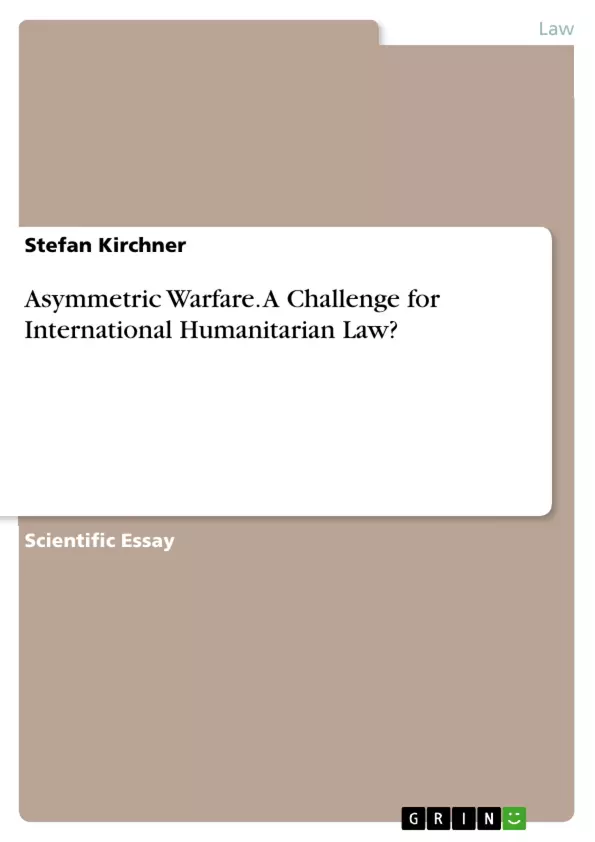Asymmetric warfare has been a hallmark of many armed conflicts of the 21st century. Written from the perspective of international law, this article asks whether the deliberate use of widespread and systematic violations of the laws of war as a strategy and / or tactic of war by some (state and non-state) actors places the ability of International Humanitarian Law (IHL) to protect civilians in wartime at risk.
Inhaltsverzeichnis (Table of Contents)
- Introduction
- Enforcing International Humanitarian Law
- Introduction
- War, military requirements and International Humanitarian Law
- Difficulties in Enforcing International Humanitarian Law
- Political Means of IHL Enforcement
- Introduction
- So called "Silent Diplomacy"
- Negative Sanctions
- Positive Sanctions
- Interim Conclusions
- The military Enforcement of International Humanitarian Law
- Enforcement with the Help of the ICRC and Red Cross/Red Crescent Societies
- Outlook
Zielsetzung und Themenschwerpunkte (Objectives and Key Themes)
This text aims to explore the challenges of enforcing International Humanitarian Law (IHL) in the context of modern asymmetric conflicts. It investigates the difficulties of ensuring compliance with IHL principles in situations where state actors are confronted with non-state groups using unconventional tactics and strategies.
- The impact of asymmetric warfare on IHL enforcement
- The changing nature of conflict and the rise of non-state actors
- The role of the military and legal community in ensuring IHL compliance
- Alternative methods of enforcing IHL beyond courts
- The challenges of applying IHL to unconventional warfare tactics
Zusammenfassung der Kapitel (Chapter Summaries)
- Introduction: The text introduces the concept of asymmetric warfare and its relevance to IHL, using the example of the Syrian conflict. It highlights the challenges of enforcing IHL in such contexts, emphasizing the need for a new understanding of its application.
- Enforcing International Humanitarian Law - Introduction: This section delves into the complexities of IHL enforcement, highlighting its paradoxical nature as a law beyond the law. It explores the difficulties in explaining the importance of IHL to the general public, given its application during a breach of international law.
- Enforcing International Humanitarian Law - War, military requirements and International Humanitarian Law: This chapter examines the impact of asymmetric warfare tactics on IHL compliance. It discusses how terrorists might view attacks against civilians as a legitimate means of targeting enemy resources, defying traditional IHL principles.
Schlüsselwörter (Keywords)
The primary focus of this text is on the challenges of enforcing International Humanitarian Law (IHL) in modern asymmetric conflicts. Key terms and concepts include asymmetric warfare, non-state actors, terrorist tactics, IHL compliance, and the role of the military and legal communities in promoting adherence to IHL principles.
Frequently Asked Questions
What is asymmetric warfare in the context of international law?
It refers to armed conflicts where state actors face non-state groups (like terrorists) who use unconventional tactics and systematic violations of laws as a strategy.
How does asymmetric warfare challenge International Humanitarian Law (IHL)?
The deliberate targeting of civilians and the use of unconventional methods by non-state actors place the protective ability of IHL at significant risk.
What are "political means" of enforcing IHL?
These include "silent diplomacy," negative sanctions against violators, and positive sanctions to encourage compliance.
What role does the ICRC play in enforcing IHL?
The International Committee of the Red Cross (ICRC) and Red Cross/Red Crescent Societies work to ensure compliance through humanitarian monitoring and aid.
Can military requirements justify IHL violations in asymmetric conflicts?
The text explores the paradox where military necessity is often used to justify breaches, though IHL is designed to limit such actions even in extreme situations.
- Quote paper
- Stefan Kirchner (Author), 2015, Asymmetric Warfare. A Challenge for International Humanitarian Law?, Munich, GRIN Verlag, https://www.grin.com/document/312247



